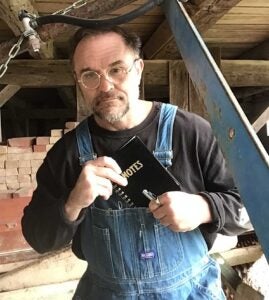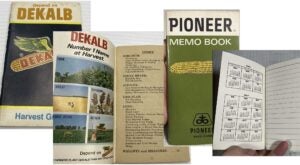As anyone living in a rural part of the United States knows, farmers have always been smart, particularly when it comes to keeping records of their field work. But when I think back to the sheer volume of data my grandfather and his peers poured through every day, it’s amazing.
One of the many tools of their trade were the little memo books distributed by seed companies, tractor manufacturers, and farmers’ cooperatives. Handy little gems, I can remember the pockets of my grandfather’s bib overalls containing at least one at any given time. I grew up riding around in an old grain truck, the dashboard of which was packed with field notebooks — my grandmother even stitched into my baby book a little homemade ledger so I could “learn to keep farm records like Grandpa.”
But somewhere around the dawn of an Internet age, the use of these little agricultural memo books started to dry up, replaced by sales literature dispatched via e-mail, programs like QuickBooks, and online data. These days, the old books serve as a bit of rural nostalgia, and collectors can purchase them online at eBay or from companies like Field Notes.

Jim Jacob, a Clay County, Indiana, farmer and owner of Prairie Grove Hunting Preserve, said he fondly remembers the old memo books from his childhood but hasn’t seen them in years.
“I don’t know the last time I saw one of them,” he said, recalling the insides would contain not just blank pages for notes from the field, but also seed population estimates, weather information, calendars, and even the old Almanac-style astrological signs.
“That was good stuff,” he remarked.
For those who’ve never seen them …
The memories of the old Royster fertilizer books stood out as I was delving into this topic, as did Golden Harvest memo books and those of Pioneer Seed. But good luck finding them now. My neighbors include a Mennonite family who run a farm store down the lane from my own farm, and I first went in to ask if they happened to have anything like that.
No, not anymore, they said. I next went to Graham Grain, another feed store in Terre Haute, Indiana, and likewise I found nothing. And then it occurred to me, it’s been years since a bank offered me a complimentary calendar or notebook. And the same is true of my insurance agent and Realtor. Much like old school business cards and other print materials, these agricultural memo books have simply gone the way of the buggy whip.
But in the years prior to online marketing, these little notebooks served the same marketing purpose as bank calendars with amortization schedules printed inside, or little memo pads with your insurance agent’s logo splashed across the top. Part advertisement, part useful tool.

A typical memo book produced by a seed company would contain a calendar, as well as a few pages explaining the different hybrids offered and seeding strategies. Others might include some geometry and ways to calculate acreage by square feet, or in odd-shaped fields. They would also include a healthy number of blank pages on which farmers would write notes while working in the field. Other books might offer conversion scales for weights and measures, or astrological information regarding the signs of the year in which planting would be best. Sized just right to fit into a shirt pocket or the front pocket of your bibbed overalls, they made great little notepads for anything a farmer might need to jot down before running to the hardware store.
Jacob, 49, whose family operates a grain farm as well as freezer beef business and hunting preserve, said he’s still pretty old school when it comes to operations. He hasn’t gone completely over to computers and still uses a physical ledger for his business. That said, most farmers himself included use smartphones and even tablets in the field now instead of hand-written notepads. The newer tractors and combines are coming out programmed with artificial intelligence and information from the field is sent directly to a computer, and most seed companies advertise their wares digitally.
Now a collector’s item
A quick search on eBay will generate a number of these old items, right alongside old seed signs, hats, and display boards. Meanwhile, the company Field Notes is a notebook brand operating out of Chicago, Illinois, born in 2006 when co-founder Aaron Draplin transformed his passion for collections into a production business. Having been collecting old memo books at auctions and flea markets since the 1990s, he’d grown attracted to the unique designs and interesting information contained within, as he explains in his short film From Seed. What started off as a run of 200 books turned into 5,000, and today the brand sports over 40 different styles using a wide array of papers and covers.
In the film, Draplin explains there’s a passion to be found in the connectivity with farmers past.
“One of the things you have to think about when you look at it is this is the landscape, really, of what the pocket material looked like carried around by the American farmer,” he said. “This is the start of what got us making Field Notes.”
Back in 1993, when he began his trek through the Midwest antiquing and going to auctions, Draplin fell in love with the handwritten notes he found within the beautifully printed covers, all unique to the brand of product being produced.
“There’s something incredible to me about some guy’s life,” he said, referencing the simple, penciled-in arithmetic farmers used in those notepads to jot down seed poundage and supply orders.
Soon he was collecting hundreds, bound together by rubber bands, with as many as 20 drawers of the old, used books. “That this would go to a landfill is incredibly sad to me,” he said.
Today that passion has grown into a full-scale printing business which produces similarly styled memo books with that legacy in mind.
It’s interesting, too, that in the year 2024, a farmer is probably using his smartphone for all the functions a notepad once served. Whether jotting down notes on the aptly named “notepad” app, using the camera to record seed bag tags, the Google browser app to look up seed population counts, or even the weather app, technology is changing the tools of the world’s oldest profession.
That said, a trip down memory lane is often a delicious treat for those of us in the rural areas who cling to our heritage like the pages of a memo pad damp with sweat.
Brian Boyce is an award-winning writer living on a farm in west-central Indiana.



